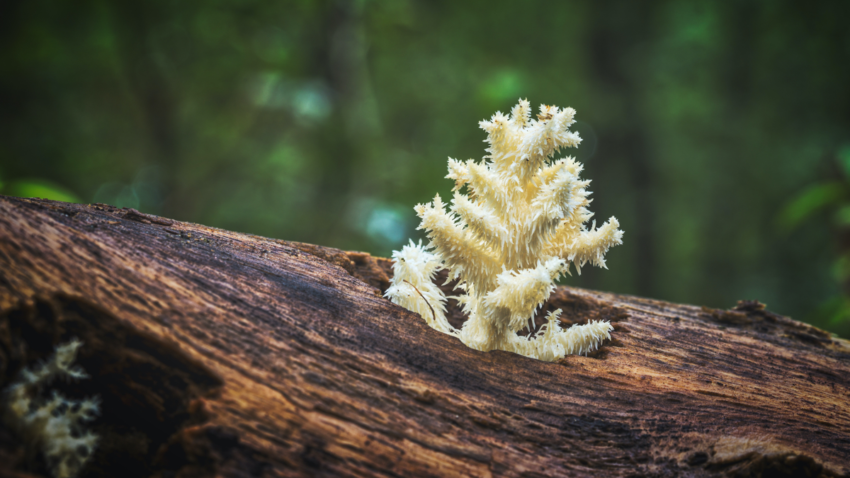If you saw a Lion’s Mane mushroom in the wild, you’d instantly understand where it got its name. While it’s small, it’s shaggy. And while this tiny fungus might resemble its namesake, can it be as mighty in health benefits as well?
Lion’s Mane 101
For starters, Lion’s Mane mushrooms aren’t exactly newcomers. They’re extremely popular in Asian countries like China, India, Japan, and Korea where people use them in the kitchen, in medicine, or as a supplement. In fact, Lion’s Mane mushrooms have been used in traditional Chinese medicine for millennia.
Supplement, you say? Does that mean that Lion’s Mane mushrooms might have some significant health benefits?
According to some preliminary research they just might. Some studies suggest that they may offer a range of health benefits, including supporting cognitive and cardiovascular health and a healthy inflammation response to routine daily activity.
A tiny “shroom” with a mighty roar.
When traditional medicine has stood the test of time for hundreds of years, our ears tend to perk up slightly. There may be something there. In the case of Lion’s Mane mushrooms, it seems may be a lot of potential. Traditional Chinese Medicine suggests it might be a powerful anti inflammatory, antioxidant, and immunostimulant wrapped into a shaggy package. In short, looks like Lion’s Mane mushrooms might be very good for you. Here are just a few of the ways.
Reduces Oxidation and Supports a Healthy Inflammation Response
Antioxidants help fight both oxidative stress in the body, and may help maintain healthy blood sugar levels already in a normal range, as well as promote heart health and healthy immune function.
A 2012 study evaluating of 14 types of mushroom found that Lion’s Mane had the fourth highest antioxidant activity, which researchers describes as “moderately high.”
Supports Your Immune Function
Lion’s Mane mushrooms may enhance the immune system, by reducing oxidative stress. Research on mice suggests that Lion’s Mane mushrooms may boost the activity of the intestinal immune system. The results of another study on mice indicate that a protein in Lion’s Mane mushrooms supports the growth of beneficial gut bacteria to help maintain healthy immune function.
Boosts Cognitive Health
It’s possible that Lion’s Mane mushrooms might boost cognitive function, but the existing research is mainly on animals.
One study showed Lion’s Mane dietary supplements appeared to give mice better object recognition and recognition memory. At the same time, other researchers have concluded that the mushrooms may support enhanced cognitive function.
But before you get your hopes up and begin scouring the woods or your local traditional Chinese Apothecary for some Lion’s Mane mushroom, remember that currently there’s a lack of research on the effects of Lion’s Mane mushrooms in humans.
However, it’s interesting to note an older Japanese study on adults aged between 50 and 80 years found that daily consumption of Lion’s Mane mushroom extract for 16 weeks led to higher scores on cognitive function scales compared with a placebo group. These scores decreased again once the participants stopped taking the extract.
Supports Digestive Health
Lion’s Mane mushroom may help digestive health by supporting normal bowel function. The mushroom may also boost immune function and support the growth of good bacteria in the gut.
Nervous System Support
Maintaining a healthy nervous system can significantly benefit your overall health. Some research suggests that extracts of Lion’s Mane mushrooms may support normal nerve cell growth and the normal cellular repair function.
How to take Lion’s Mane.
While actual clinical trials of Lion’s Mane are still in their infancy, the overall consensus is Lion’s Mane is completely safe and A-OK. So let’s say you’re ready to take the fungus plunge. Now it’s time to talk about how you can add it to your diet. Fortunately, because Lion’s Mane mushrooms come in powder, liquid, capsule, or tablet forms, there’s no shortage of opportunities to.
1. Cook them.
Eating Lion’s Mane mushrooms aren’t for the faint of heart. In a word, they taste awful. In two words, they taste like awful dirt. But don’t let that deter you, intrepid biohacker. If you want to add them to your diet, cook them until the outer layer is crispy and enjoy. Or don’t enjoy.
2. Take them as a supplement.
A far more palatable way to put the benefits of Lion’s Mane into your diet is to take them as a supplement. If you do, here’s our caveats: the dosages on Lion’s Mane supplements can vary, so make sure you read the instructions carefully. And, as always, it’s a good idea to discuss any new supplement you add to your regimen with your doctor first.
Lion’s Mane supplements come as capsules, extracts, and powders. As you know, when it comes to supplements, you get what you pay for. So make sure you choose your supplements from a trusted company. Don’t skimp.
As you begin to take your Lion’s Mane supplements, start with a small dosage and gradually increase (while never exceeding the recommended dosage) to see how your body responds. If you experience any side effects, stop taking and talk to your doctor.
All roar. No bite.
Lion’s Mane mushrooms might not look appetizing (and they actually taste as gross as they look), they show immense promise as a bioactive supplement that every biohacker should consider adding to their diet.
It’s a supplement that’s been shown to support brain health and have a positive impact on focus, mood, and memory. So if you want to think clearer, remember more, or just live a little healthier, give these shaggy ‘shrooms a try. They’re safe and effective. And they might just give your day the boost it needs. Have you tried Lion’s Mane mushrooms? We’d love to hear about your experience.


I was reading some of your content on this internet site and I think this internet site
is real informative! Keep putting up.Raise blog range